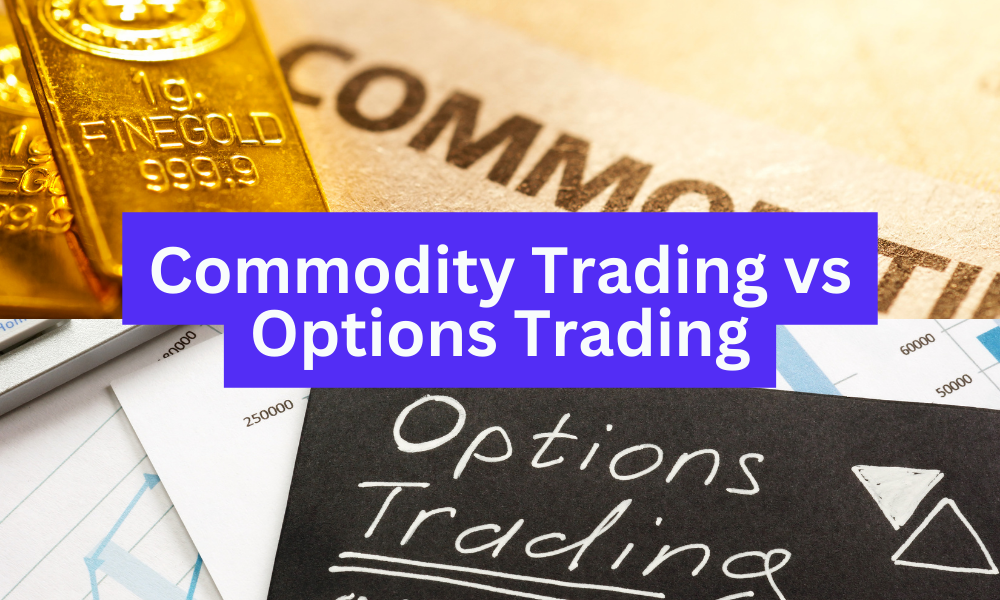Commodity Trading vs Options Trading

Commodity trading and options trading are both distinct forms of financial trading, each with its own characteristics.
| Feature | Commodity Trading | Options Trading |
|---|---|---|
| Underlying Assets | Physical goods or raw materials | Contracts for various underlying assets (commodities, stocks, indices, etc.) |
| Nature of Contracts | Involves physical commodities or contracts for future delivery | Involves options contracts, providing the right (but not the obligation) to buy or sell an underlying asset |
| Ownership and Rights | May involve ownership of physical commodities or contracts | Option buyers have the right to exercise; option sellers have the obligation if exercised |
| Risk and Return | Risk and return depend on the price movements of physical commodities | Leverage potential with limited risk (premium paid for the option) |
| Market Exposure | Direct exposure to supply and demand dynamics of the physical commodity market | Exposure to price movements without owning the underlying asset |
| Market Platforms | Traded on commodity exchanges | Traded on options exchanges |
| Expiration and Exercise | Actual delivery or settlement of the commodity | Options have expiration dates, and they can be exercised before or at expiration |
| Flexibility | Involves straightforward buying and selling of physical goods or futures contracts | Offers a variety of strategies beyond buying and selling, including hedging and income generation |
| Regulation | Governed by commodity market regulators | Regulated by financial authorities and options exchanges |
Underlying Assets:
Commodity Trading: Involves the buying and selling of physical goods or raw materials like gold, oil, agricultural products, etc.
Options Trading: Involves contracts that give the holder the right (but not the obligation) to buy or sell an underlying asset, which could be commodities, stocks, indices, or other financial instruments.
Nature of Contracts:
Commodity Trading: Involves the actual buying and selling of the physical commodity or contracts for future delivery.
Options Trading: Involves the buying and selling of options contracts, which can be call options (the right to buy) or put options (the right to sell) an underlying asset at a specified price before or at expiration.
Ownership and Rights:
Commodity Trading: Commodity traders may gain ownership of the physical commodity or may be involved in contracts related to its future price movements.
Options Trading: Option buyers have the right but not the obligation to exercise the option. Option sellers (writers) have the obligation to fulfill the terms of the option if the buyer decides to exercise.
Risk and Return:
Commodity Trading: Risk and return depend on the price movements of the physical commodity. Leverage may be available, amplifying both gains and losses.
Options Trading: Options provide leverage, potentially allowing for significant returns. However, the risk is limited to the premium paid for the option.
Market Exposure:
Commodity Trading: Direct exposure to the supply and demand dynamics of the physical commodity market.
Options Trading: Provides exposure to price movements without the need for ownership of the underlying asset.
Market Platforms:
Commodity Trading: Takes place on commodity exchanges.
Options Trading: Takes place on options exchanges.
Expiration and Exercise:
Commodity Trading: Typically involves the actual delivery or settlement of the commodity.
Options Trading: Options have expiration dates, and they can be exercised before or at expiration, depending on the type of option.
Flexibility:
Commodity Trading: Involves straightforward buying and selling of physical goods or futures contracts.
Options Trading: Provides a range of strategies beyond simple buying and selling, such as hedging, speculation, and income generation.
Regulation:
Commodity Trading: Governed by commodity market regulators.
Options Trading: Regulated by financial authorities and options exchanges.
Both commodity trading and options trading offer unique opportunities and risks. The choice between them depends on an investor’s risk tolerance, financial goals, and market outlook. Some investors may use both forms of trading to diversify their portfolios.

